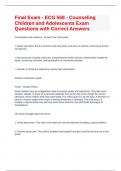Final Exam - ECG 558 - Counseling
Children and Adolescents Exam
Questions with Correct Answers
Communities and resilience - Answer-The Community:
> Values education, there is structure and clear limits, and there is positive mentoring at school
and beyond
> Has resources of quality child care, comprehensive family services, relationships outside the
family, community cohesion, and participation in community activities
> Overall, is caring and supportive, having high expectations
Dreikurs misbehavior goals
Power - Answer-Power -
Some children have an exaggerated need to exercise power and superiority. They take every
situation, debate, or issue as a personal challenge from which they must emerge the winner;
otherwise, these children think they have failed. The child's goal is to be the boss. A teacher's or
parent's reaction ranges from anger to feeling threatened or defeated. The child acts in a
stubborn, argumentative way and may even throw tantrums; this child leads the league in
disobedience.
The power struggle takes two forms:
1. Active destructive. This child is the rebel who has the potential of leading a group rebellion.
2. Passive destructive. This child is stubborn and forgetful and also could be the lazy one in the
group.
,Family conditions and resilience - Answer-Resilience is the ability to handle stress in a positive
way. Families:
> Have ties with caregivers and friends with stable households.
> are warm, structured, and have positive discipline practices.
> Parents monitor their children, listen, and talk to the child
> Have a faith that gives them a sense of coherence, meaning, and compassion
Resiliency in children - Answer-> The ability "to continue to progress in their positive
development despite being 'bent,' 'compressed,' or 'stretched' by factors in a risky environment"
(p. 368).
>The capacity all young people have for healthy development and successful living.
Positive development and resilience - Answer-Four categories of personal strengths are the
positive developmental outcomes of resilience:
1) Social competence -
> Have a friendly nature, the ability to elicit positive responses from others, and good verbal
skills.
> Can communicate their personal needs in an appropriate way.
> Show empathy, compassion, altruism, and forgiveness toward others.
> Receive affection and support from caregivers.
2) "Good intellectual functioning" =
,> Are active problem solvers
> Are proactive, intentional, and flexible
> Use critical thinking skills and have the capacity to develop meaningful insight.
3) Autonomous
> Act independently and have a sense of control over the environment
> Have an internal locus of control, initiative, self-efficacy, mastery, adaptive distancing,
mindfulness, and humor
4) Have a sense that life has meaning
> Have faith in the future, goal direction, creativity, special interest, optimism, and hope
17th century people and treatment of children - Answer-Young ones were considered "unformed
adults. Children were still regarded as the property of their parents.
Invention provided new idea of adulthood - Answer-The development of the printing press in the
15th century. That invention provoked a new idea of adulthood—being able to read—and of
childhood—not being able to read.
Types of insecure attachments - Answer-Avoidant
> Describe their parents as demanding, disrespectful, and critical.
> As adults, they mistrust partners and had anxiety about people getting too close to them.
> They downplay their need for love and their belief they will be abandoned.
, > They believe that others do not like them and that love is elusive.
> Their intimate relationships are apt to include jealousy, emotional distance, and lack of
acceptance.
> They avoid relationships due to their discomfort over intimacy and being dependent
Resistant -
> Characterize their parents as unpredictable and unfair.
> Worry about intense feelings overwhelming them and about being abandoned by those they
love.
> Their relationships include jealousy, emotional highs and lows, and desperation.
> They think little of themselves and others and have a confused, unpredictable array of
neediness and fear of closeness
Erikson's beliefs - Answer-> Each person faces a crisis that must be resolved in order to
achieve a new stage of social interaction.
> Unsuccessful resolution may hinder further development and can have a negative impact.
> Places more emphasis on society and the demands of the world whereas Freud focuses on
internal conflict
Erikson's childhood and adolescent stages - Answer-Trust versus mistrust - Infant to 18 months
Autonomy versus shame and doubt - 18 months to 3 yrs




